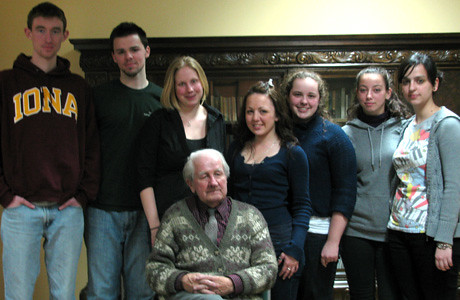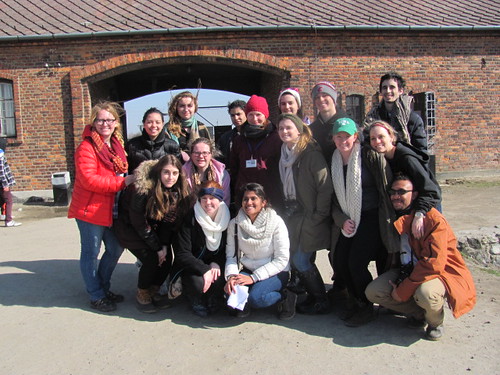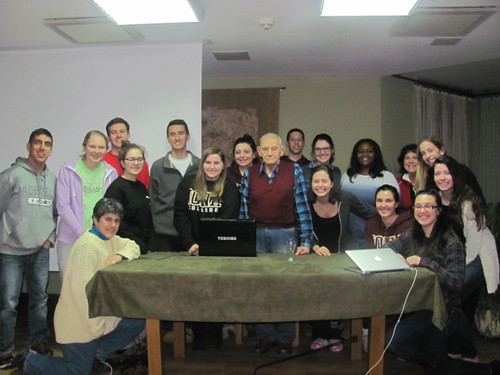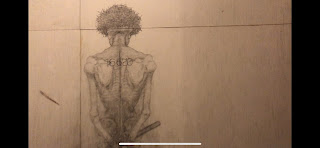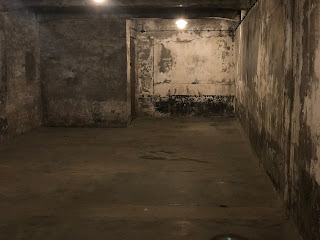For the past few years, I have commonly heard that we are losing the greatest generation. This phrase refers to those who were born in the time period of 1901 to 1927, and many of these people fought in WWII. This generation also includes the survivors of the Shoah. Unfortunately, those who were old enough to have memories of being in the Holocaust are getting older and older and passing away.
While we were at the JCC, or the Jewish Community Center in Krakow, we attended a Shabbat service and dinner. While we were waiting for the service to start, a husband and wife came in, and the wife started asking us about our trip. Her husband joined and we soon found out that he was a child survivor. He was born in Berlin, Germany, and was nine years old when restrictions started being placed on Jewish people. He told us how he remembered his mother giving him a sweater with a gold star on it, and how she told him he had to wear it at all times. This was the modern version of Canon 68, put out by the Fourth Lateran Council stipulating that Jews and Saracens had to be distinguishable through their dress. One day on his way to school he decided not to wear it. He was stopped by officers in brown uniforms who asked him where he was going. He pointed to his books and backpack and said he was going to school. They asked him if he was a Jew. He said he clearly remembered the anxiety he felt in that moment, not knowing the right answer to the question. Unfortunately, we did not get to hear the end of the story because we were interrupted.
He also told us how he remembered Kristallnacht. His father owned a few shops, and he remembered all the broken glass and the looting that happened to his father’s stores. After Kristallnacht, his family fled Germany and ended up in Panama. From there they were able to gain access to the US. He was able to live his life and get PhDs in economics. He built a successful career in areas of nuclear energy and artificial intelligence.
I thought it was really interesting and impactful to meet a child survivor, especially in the place of his worship. Six million Jewish people never got the opportunity to get PhDs or educations because they were targeted for their beliefs. His family was lucky. They were able to escape Germany before they were shipped to either a concentration camp, a forced labor camp, or even a death camp. He was very open about sharing his story, and we were really fortunate to be able to get to opportunity to meet him and hear his story. It makes me think about all the survivors who are going about their daily lives while still bearing the weight of their experiences in the Shoah.
While we were at the JCC, or the Jewish Community Center in Krakow, we attended a Shabbat service and dinner. While we were waiting for the service to start, a husband and wife came in, and the wife started asking us about our trip. Her husband joined and we soon found out that he was a child survivor. He was born in Berlin, Germany, and was nine years old when restrictions started being placed on Jewish people. He told us how he remembered his mother giving him a sweater with a gold star on it, and how she told him he had to wear it at all times. This was the modern version of Canon 68, put out by the Fourth Lateran Council stipulating that Jews and Saracens had to be distinguishable through their dress. One day on his way to school he decided not to wear it. He was stopped by officers in brown uniforms who asked him where he was going. He pointed to his books and backpack and said he was going to school. They asked him if he was a Jew. He said he clearly remembered the anxiety he felt in that moment, not knowing the right answer to the question. Unfortunately, we did not get to hear the end of the story because we were interrupted.
He also told us how he remembered Kristallnacht. His father owned a few shops, and he remembered all the broken glass and the looting that happened to his father’s stores. After Kristallnacht, his family fled Germany and ended up in Panama. From there they were able to gain access to the US. He was able to live his life and get PhDs in economics. He built a successful career in areas of nuclear energy and artificial intelligence.
I thought it was really interesting and impactful to meet a child survivor, especially in the place of his worship. Six million Jewish people never got the opportunity to get PhDs or educations because they were targeted for their beliefs. His family was lucky. They were able to escape Germany before they were shipped to either a concentration camp, a forced labor camp, or even a death camp. He was very open about sharing his story, and we were really fortunate to be able to get to opportunity to meet him and hear his story. It makes me think about all the survivors who are going about their daily lives while still bearing the weight of their experiences in the Shoah.
 |
| A map of many of the place Jews were deported from. |




